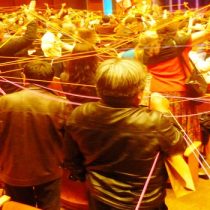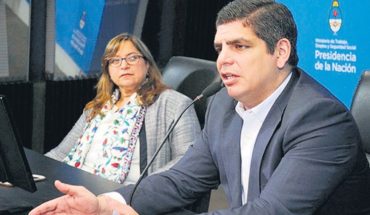
Living beings interact with other organisms in their habitats in interdependence dynamics. In the case of our human life as a society that is, establishing a reciprocal relationship or mutual correspondence between two or more people.
Gandhi claimed that interdependence was and should be the ideal of the person, understood as self-reliance. We are social beings and our interaction with society shows uniqueness with our historical context and, in this way, facilitates the suppress of selfishness so present in the different variants of prevailing individualism. Social interdependence tests our commitment to the historical time we share with a sense of heritage.
Chile lives an important historical time with the opening of the constituent process, after majority approval to develop a new political constitution, through a joint constitutional convention with 100% representatives elected by citizens. Having said that, the focus has been on who will be elected as those responsible for drafting the new constitution and how those women and men sent for that institutional purpose will arrive on the ballot in the election of 11 April 2021.
Much has been written and said about the quality, origin and suitability of those who should draw up the magna letter that will govern us as a country in the coming years or decades. Legally constituted political parties have the right and duty to run for their own ranks and to add independents interested in receiving support from a part-party structure. For their part, there are different organized initiatives of independents that will be presented to the constituent election by their means and possible spaces in accordance with the legal provisions.
80% of citizenship was strongly expressed in the entry plebiscite in order that the citizen decision goes beyond a hope delegated to the constituted power, as sovereign power was erected as a clear mandate to make the constituent process an area of collaboration, active, democratic, inclusive and deliberative that advances towards balance as optimal , that is, a citizen who wants to prosper in peace, with justice and dignity; therefore, the challenge of drafting a new constitution arises from the desire for a contract that ensures a dynamic balance as the optimal endorsement in the common good.
This mandate strongly invites political elites to facilitate the participation of candidates who are not part of party organizations. At the same time, sovereign citizenship hopes that political parties will not bring from constituent candidates to politicians who have been part of the power constituted and responsible for the crisis of institutional legitimacy questioned and placed by the sovereign power that demands new rules of the game.
Returning to the concept of interdependence, we know that there are different types of interdependence, including positive, negative, complex; however, in a Gandhian sense, we are interested in putting the emphasis on the levels of interdependence that are required to direct and participate in this constituent process, where the uniqueness of purpose generates a commitment to historical time and its scope and impact on a possible and desired future.
A new constitution is relevant as a political declaration, sovereign spirit and institutional body to overcome the crisis of systemic institutional legitimacy that drags itself for several decades in Chile and transform it into an opportunity, where that desired future becomes part of the natural democratic dynamic, beyond the constitution itself. In other words, not all dreams are fulfilled in reality and often reality surpasses one’s dreams themselves. This is life’s game as a mystery and the auspicious challenge ahead.
The politicians and congressmen constituted opened the ongoing constituent process on 15 November 2019 with the negotiated agreement reached and, in part, have understood the dimensions of the crisis of institutional legitimacy of which they are parties and directly responsible for their institutional representation and know what that 80% means as a sovereign mandate where the citizen majority opted for a constitutional convention to draft the new constitution with a shared and including future perspective or strategic dialogue for a national convergence of purposes. The slope is to co-learn to put it into practice.
The constituent process invites you to consider space(s) of collaborative interdependence and innovative tools other than traditional ones offered by politics and its logic of classical representative democracy, i.e. to vote, elect and delegate to the elected the resolution of the issues for which it was voted and chosen, whether independent or militant.
Chileans can move towards a culture of collaborative innovation that makes the interdependence between citizens, state powers and all those incidents more visible and evident in a democratic national strategy for ecosystem adaptability that requires local and global interdependence, beyond the need for a vaccine, beyond the indicators that today measure the economy , politics and the exercise of citizenship in times of systemic and ecosystem crisis. In this sense, this constituent process cannot go with girls, let alone with letters of girls typical of that democracy of the elites who have ruled us.
Collaborative innovation is a type of open innovation where individuals and organizations develop a common platform from which to reflect, share resources and provide solutions for joint innovation and exchange of ideas, knowledge, experiences, learnings, practices, aspirations, opportunities and sustainable outcomes.
Collaborative innovation is possible when interdependence levels are obvious and urgent, as the participation of candidates and independent candidates in the constituent election process could potentially be a failure if they are committed to mere voluntarism and despise effective spaces of strategic collaboration. Similarly, party nominations could eventually confuse targeted strategy and play cards spent or tricked out of the sovereign mandate to choose citizens eligible for this responsibility with criteria of inclusiveness and diversity. Both possibilities would not live up to the sovereign voter and his constituent power.
Historical responsibility demands to open platforms of dialogical creativity and collaborative innovation so that the constituent power of interdependents is expressed from a space offered with generosity and fraternity, making this space an exercise to practice the common good and an opportunity to position Chile as a country that awakened and set out to sail against winds, tides , pandemics and climate change, equipped with new legitimacy and intergenerational dialogue, to address the complexity and uncertainty of a citizen democracy co-built with dignity and sustainability.
The content poured into this opinion column is the sole responsibility of its author, and does not necessarily reflect the editorial line or position of El Mostrador.





